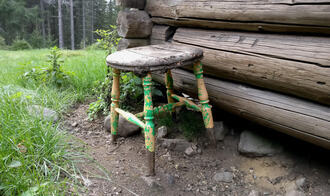Stool
 What kind of response do you think you would get if you went into a furniture store and asked to see some stool samples?!
What kind of response do you think you would get if you went into a furniture store and asked to see some stool samples?!The word stool has its origins in Proto-Indo-European (PIE) sta-lo (to stand, to make firm). From this source came Proto-Germanic stola and Old English stol (a seat for one person).
The Old English word cynestol (a king’s seat; cyne + stol) referred to a throne. The use of stol meaning a seat fell from favor in the medieval period with the introduction of the word chair from French. (If not for William the Conqueror, we might now be using the term stoolperson instead of chairperson.)
After the 14th century, a stool was simply a small seat without arms or backs, sometimes just a piece of wood mounted on three legs. By the early 15th century, such a stool was often relegated to a privy (a private space).
Speaking of a privy, how did the word stool come to mean the product of a bowel movement? Perhaps it was more polite to say stool (where you sat) than to say the words, polite or otherwise, for what you produced while you sat. By the 1530s, stool was a euphemism for a b.m.
The word privy, from around 1200, referring to a latrine or outhouse, is from Latin privatus (private, personal).
And, if you’re looking for a stool and you’ve got some spare cash, check out a 1960’s Charlotte Perriand Wooden Stool (used), on sale for $CA6,718.96.
Reference: Online Etymological Dictionary, https://www.etymonline.com/
Published on January 25, 2024 09:32
No comments have been added yet.



